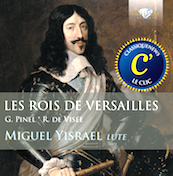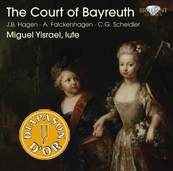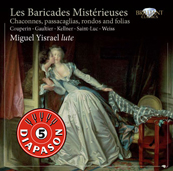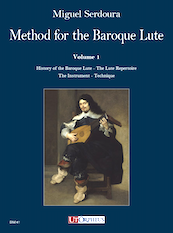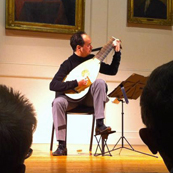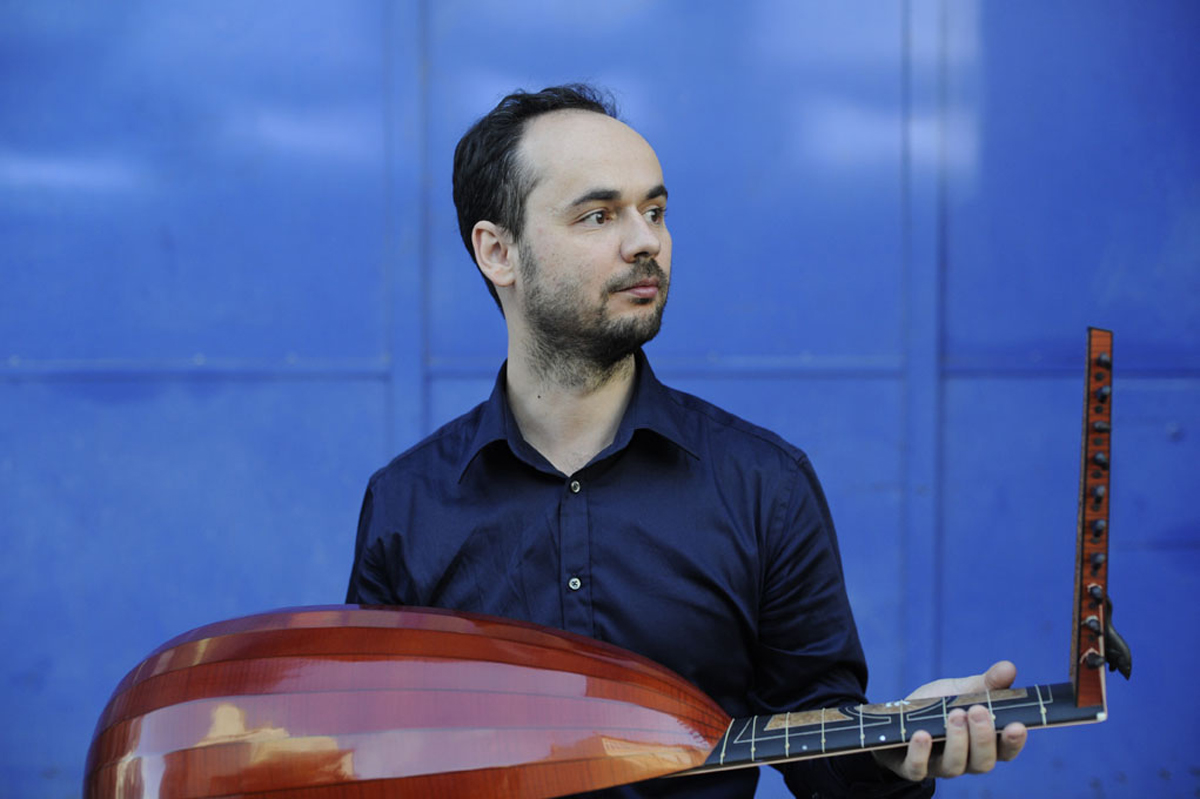Notice
-
classiquenews
 Awarded: CLIC "Between restraint and languor, mystery and enigma, Miguel Serdoura has definitely distinguished himself. […] The maturity of the playing, its finesse and suggestive intelligence are the miracle of this enchanting disc: it is an incredible tribute to the great lutenists of early 17th century France. […] The interpreter has not only put forth here his best record: he is also at the pivot of his career, a stepping stone for him to cross into a new international adventure where the lute has more than ever its place. For rehabilitation and the rediscovery of the art of playing the lute, no doubt: this superlative recording will count." Camille de Joyeuse, Classiquenews (France, 01/2015) Read more / Download
Awarded: CLIC "Between restraint and languor, mystery and enigma, Miguel Serdoura has definitely distinguished himself. […] The maturity of the playing, its finesse and suggestive intelligence are the miracle of this enchanting disc: it is an incredible tribute to the great lutenists of early 17th century France. […] The interpreter has not only put forth here his best record: he is also at the pivot of his career, a stepping stone for him to cross into a new international adventure where the lute has more than ever its place. For rehabilitation and the rediscovery of the art of playing the lute, no doubt: this superlative recording will count." Camille de Joyeuse, Classiquenews (France, 01/2015) Read more / Download -
harry's classical music corner
"Three world premieres no less on this CD, works never recorded before, and that makes this cd a novelty not to be missed. Serdoura is not a unknown musician in this field. I known this for a long time, for I have quite a few recordings by him. A thoughtful and scholarly performer with a penchant for detail and phrasing. His artistry lies in the fact that he is totally committed to this instrument and this you hear in both the composers on the disc. His tempi give the music time to breath without hampering the flow, which is a constant throughout. He excels especially in the suites by Robert de Visée, which you might hear in the Allemande, first movement of the Suite in D minor. German Pinel is a great composer too. The three suites composed by him, breath the same excellence as De Visée. The Suite in F might be a good suite to sample if you want to hear this. The recording is excellent. Booklet gives a lot of info about the Kings of Versailles, their instruments the Lute, a short history of the rise and fall of the lute, and a short biography about both composers. A literature list is added too. A really successful recording, be it a short playing time. An extra suite or two was possible." Harry van der Wal, Harry's classical music corner (Holland, 01/2015) Read More / Download -
alte-musik forum
"In 17th-century France an instrument was mostly considered the king which in many respects is the complete opposite: the lute. It was the instrument of the Kings of France. Miguel Serdoura, who hereby submits his fourth production with Brilliant Classics, has described the situation at the court and the significance of its lutenists vividly in his very detailed accompanying text; his recordings come out every two years, and it is quite obvious how diligently he prepares them. It is particularly gratifying that he presents three suites by Germain Pinel, most of which as world premiere recordings. Pinel was the lute teacher of the young Louis XIV. The fact that it has been transcribed by harpsichordists more often than that of his colleagues and that it is perhaps of greater influence is immediately comprehensible. In contrast, the music of Robert de Visée, who was born after Pinel's death, takes the listener to a later time. Miguel Serdoura's performance is, as usual, stylistically assured, insightful and clear, perfect in the contrasting choice of tempo and emotional representation. A new release to be recommended in every way ! "Alte-Musik Forum (Germany, 12/2014) Read More / Download
-
Audioclásica
 Awarded: 4 Stars Audioclásica "This record is good, very good! A record of generous duration, unbeatable price and remarkable interpretation. The portuguese belongs to a new generation of lutenists that have not yet reached thirty, with a long and bright career ahead, and this third milestone recording allows it to assume. There is relay in the Olympus of Baroque Lute to Anthony Bailes, Hopkinson Smith or José Miguel Moreno. Little more can be asked." Josemi Lorenzo Arribas, Audioclásica (Spain, 07/2012) Read More / Download
Awarded: 4 Stars Audioclásica "This record is good, very good! A record of generous duration, unbeatable price and remarkable interpretation. The portuguese belongs to a new generation of lutenists that have not yet reached thirty, with a long and bright career ahead, and this third milestone recording allows it to assume. There is relay in the Olympus of Baroque Lute to Anthony Bailes, Hopkinson Smith or José Miguel Moreno. Little more can be asked." Josemi Lorenzo Arribas, Audioclásica (Spain, 07/2012) Read More / Download -
diapason
"Miguel Serdoura made a remarkable debut with the publication of two anthologies which were clearly touched by grace ("The Court of Bayreuth" and "Baricades Mistérieuses", cf. No. 583). The brilliant instrumental qualities of this young Portuguese lutenist, set his poetic talents free to give expression to the pieces originally for Baroque lute, just as well as to those rare transcriptions for this instrument. […] The two Austrian composers chosen for the program of this new album, were both born in 1676, the best representatives of the Viennese school, which is too often equated with the style of the great German lutenist Weiss.Miguel Serdoura champions these forgotten composers, with equal sensitivity and tact, retaining a relative distance that leaves the imagination of the listener free to enjoy his sound palette. […] Again, we are completely won over by this former student of Hopkinson Smith, and the subtle blend of freedom and rigor that characterizes this master of agogics (subtle macro and micro rhythmic timing variations)." Philippe Ramin, Diapason, N°606 (France, 10/2012) Download -
classiquenews.com
"Dazzling recordings do indeed occur, and this latest achievement by the exceptionally talented luthenist, Miguel Serdoura, one of the most brilliant pupils of Hopkinson Smith, is an outstanding example of this. His rare inner sensitivity, the delicate refinement, the fluidity and subtlety and altogether Viennese elegance of his playing give him all the necessary qualities for successfully bringing us this daring and rarely heard or interpreted program. Nothing is missing from this lutenist's interpretation, who born in 73, signs here one of his most accomplished albums, a natural step from his earlier realisations. […] Miguel Serdoura is in that pure tradition of poet musicians, the embodiment of the new generation of lutenists at the apex of their art, masterful in his approach to the music, assured in the elegant economy of his well structured style, both inspired and exquisitely refined as he traces out for us an often gossamer-like web of music. […] It is surely be impossible to achieve a fuller sound, a more convincing or more suited tone or structured style; but on top of the maturity of his style and interpretation, the lutenist also offers us the daring of a completely unrecognized repertoire. Elation and elegance of the Viennese lute!". Benjamin Ballifh, Classiquenews.com (France, 06/2012) Read More/ Download -
svenska yle
"English lute music from the early baroque era is well known for its soul soothing melancholy. However, the soul is always in need of new and varied solace; so I am happy to have found that melancholy lute music was also composed in Austria.[…] Even the mood of the fast dance pieces is meditative and melancholic. However, compared to Dowland, this particular melancholy seems less personal and overwhelming, and as such may be suitable for soothing a different state of mind. Perhaps this music can be played as a cure for grey long term anxiety, while Dowland is better saved for pitch black but temporary anguish.[…] Miguel Yisrael has all the musical qualities to act as the medium for curing the soul. He has patiently teased out and dwelt in the mental states of these court lutenists and manages to bring this to us through the densest textures and most refined grace notes, unassumingly." Kare Eskola, Svenska Yle (Finland, 09/2012) Read More / Download -
bloggermusic.com
"Although the works of W. J. Lauffensteiner and J. G. Weichenberger were stylistically similar to the German school of lute music, they carved out a distinct and independent Austrian movement; this new recording by acclaimed lutenist Miguel Yisrael celebrates their achievements through a programme dedicated to their partitas. Lute music was, in fact, a central part of Austrian culture in the 17th and 18th centuries: the Habsburgs, for example, played the instrument and employed virtuoso musicians to compose and perform for them. In addition to this, Lauffensteiner and Weichenberger were also exposed a wealth of stylistic influences, primarily the intricate French style of lute playing and the emerging Italian style, which featured a greater emphasis on melody. This rich combination of influences is embodied in their music – idiomatic works blending French textures with song-like melodies that foreshadow the 18th-century galant style. This recording is a valuable snapshot of the uniquely Austrian style of lute playing. Miguel Yisrael’s performances demonstrate a deep resonance with this repertoire, and reveal his exemplary approach to the technical and stylistic intricacies of his instrument.". Bloggermusic.com (Chile, 12/2013) Read More/ Download
-
Early Music Society Queensland
"I have little doubt this disc would be of great interest to lute specialists looking for good substantial repertoire for their instrument. Miguel plays an 11-course Baroque Lute by Renzo Salvador. The tuning of the instrument is quite low (I am guessing but I think the reference point could be A=392 Hz). This gives a relaxed and sombre quality that is beautifully reflected in the cover photo on the disc. I am tempted to recall the stories of kings of old who, when suffering melancholia, called their musicians to play and soothe their souls. I feel this disc has just that soothing quality: it would be a fine addition to the CD collection of any early music lover ... and especially good to soothe that odd moment of melancholia." Gillian Rankine (Australia, 09/2012) Download -
lute news
"The low pitch perfectly suits the sombre mood of the magnificent Tombeau which opens the C minor Partita by Lauffensteiner, played by Serdoura with a gripping emotional intensity. […] A performance of natural musicality, with delicious ornamentation, attractive tone quality, and easy authority. I have enjoyed listening repeatedly to this CD, and my thanks go to Miguel Serdoura for highlighting this little-know music of such high quality." Peter Martin, Lute News N° 103 (England, 10/2012) Download -
midlife music musings
"It’s hard to believe that Miguel Yisrael has released his third recording. It seems like it was not too many years ago since he did his first recording, Les Baricades Mistérieuses. Actually, it has been 3½ years. In that time, Miguel has continued to mature. I don’t think any lutenist has a more beautiful sound. Miguel remains a poet extraordinaire, choosing to present a beautiful and refined performance in which technique (impeccable) is only the servant. Miguel, who has a vast perspective of the literature, has made a bold introduction of what he characterizes as a unique Austrian school, performing pieces by two previously overlooked masters, W. J. Lauffensteiner (1676–1754) and J. G. Weichenberger (1676–1740). […] All of his recordings represent the finest recorded sound for the baroque lute in my collection. This recording is just a little piece of heaven !" Kemer Thomson, Midlife Music Musings (USA, 05/2012) Read More / Download -
estar magazine
"A whiff of damp sea air and the nostalgia of Lisbon emanates from the lute-playing poet, as if going back to the classical baroque was but an exercise of tame memory; something like a virtuous aroma of highly polished mahogany and the dust of attics. Music that tames, if not beasts, at least those of us who remain in this den of wolves." Estar Magazine (Spain, 03/2013) Download -
lute the instrument
"The musical year of 2012 begins in the best way with the release of Miguel Yisrael’s third album. The Portuguese musician, undisputed master of the baroque lute of and one of the brightest lutenists of the new generation, releases now an album with music by two Austrian composers born in the year of 1676: Wolff Jacob Lauffensteiner (1676-1754) and Johann Georg Weichenberger (1676 - 1740). Until recently, there was a tendency to include the works of these composers in the German lute repertoire. Some of these pieces were even wrongly attributed to the great Sylvius Leopold Weiss, however, the music of these Austrian composers have independent features from the better known German style, so it is appropriate to speak of Austrian lute music. Recorded in Austria, this album is another unmissable record of the highest quality, which the two previous albums by Miguel Yisrael accustomed us. A trip in time, the peace of mind for early music lovers, the inspiration for students of the instrument like me. Highly recommended." Luis Maciel, Lute the instrument (Brazil, 01/2012) Read More/ Download -
klassiekezaken
"Miguel Yisrael is a delicate and refined lutenist who knows exactly where and how to use the accents on this music." Marcel Bijlo, Klassiekezaken (Holland, 05/2012) Read More / Download
-
diapason
 Awarded: Diapason d'Or Découverte "The articulation shades an elegant and fluid discourse. And even if one perceives the influence of great masters, the discourse is of strong and unique personality. […] A double-revelation for a poetic lutenist and his ancestors who used to enchant the court of Bayreuth. […] An interpreter to be followed closely". Philippe Ramin, Diapason, n°583 (France, 09/2010) Download
Awarded: Diapason d'Or Découverte "The articulation shades an elegant and fluid discourse. And even if one perceives the influence of great masters, the discourse is of strong and unique personality. […] A double-revelation for a poetic lutenist and his ancestors who used to enchant the court of Bayreuth. […] An interpreter to be followed closely". Philippe Ramin, Diapason, n°583 (France, 09/2010) Download -
cdhotlist
Awarded: Rick’s Pick "By the time these three composers were writing lute music for Frederick the Great’s court in Bayreuth, the wave of German mania for French culture had crested and begun to recede, in favor of a more cantabile style–more restrained, more serious, less frou-frou. Miguel Yisrael is a highly distinguished player and a brilliant interpreter of these relatively rarely-heard pieces, which include a set of variations on a theme from Mozart’s Don Giovanni as well as four sonatas by the top-billed composers. In all ways excellent.". Rick Anderson, CD HotList (USA, 10/2012)
-
appoggiature
 Awarded: Appoggiature d'Or "Yes the strings sing under the subtle touch of Miguel Serdoura in these Sonatas as in those that follow - a true disciple, then of Hopkinson Smith, there certainly are lesser masters – bringing us exquisite pleasure. This is indeed a lesson in subtle touch in which the technique of ornamentation and the expressive depth are as one, each serving the other. Miguel Serdoura spins his web of notes into an intricate cameo, with the apparent detachment which is the mark of a great musician". Jacques Duffourg, Appoggiature (France, 12/2011) Read More / Download
Awarded: Appoggiature d'Or "Yes the strings sing under the subtle touch of Miguel Serdoura in these Sonatas as in those that follow - a true disciple, then of Hopkinson Smith, there certainly are lesser masters – bringing us exquisite pleasure. This is indeed a lesson in subtle touch in which the technique of ornamentation and the expressive depth are as one, each serving the other. Miguel Serdoura spins his web of notes into an intricate cameo, with the apparent detachment which is the mark of a great musician". Jacques Duffourg, Appoggiature (France, 12/2011) Read More / Download -
classiquenews.com
"The technical expertise and, above all, the evocative tact following the natural breathing, confirm the excellent musical reading of Miguel Serdoura, himself a disciple of Hopkinson Smith. His playing reveals several gems of the Prussian school of lute. The lutenist knows economize, prepare, slow, increase: his approach emphasizes the tension and the intensity, giving to each selected piece a sophistication fill with unprecedented sensitivity. Captivating!" Sylvain Giambello, Classiquenews.com (France, 06/2010) Read more... / Download -
lauten-info
"While some conventionalize precisely Falckenhagen’s sonatas from Opus I, Miguel handles them in a mysterious and exciting way. One can almost imagine Wilhelmine at evening amusements in small circles: “Falkenhagen, shall it be!” Hagen’s music, however, needs another style. The palette of emotions involved range from restrained to explosive ones, and a musician like Miguel Yisrael introduces the listener into the sensitive world of Sentimentalism originating from Pietism and leading to Romanticism later on." Joachim Domning, Lauten-Info, The German Lute Society (Germany, 02/2010) Download -
geluit-luthinerie
"Miguel Yisrael plays with tremendous sensitivity and a great sense of style." Greet Schamp, Geluit-Luthinerie, The Belgium Lute Society (Belgium, 09/2010) Download -
audiophile mélomane
"The lute is an aristocratic instrument, and the music devoted to him is equally so. In this, the interpretation of Miguel Yisrael do not forget to remind us, even if it is not free of abandonment. With a poetic soul and imagination, he put his teaching and his talents to the service of harmonious pieces, generous and with extraordinary smoothness. "Thierry Herve, Audiophile Mélomane (France, 10/2010) Read More / Download
-
diapason
 Awarded: 5 Diapason "A surprising discovery of a lutenist with a substantial discourse becoming even stronger with Couperin’s Baricades Mistérieuses which do not lack the harpsichord for even an instant. Admirable – both the quasi vocal support of the timbre and the perfect energy being more expressive than forcing tempos or contrasts. Philippe Ramin, Diapason, n°583 (France, 09/2010) Download
Awarded: 5 Diapason "A surprising discovery of a lutenist with a substantial discourse becoming even stronger with Couperin’s Baricades Mistérieuses which do not lack the harpsichord for even an instant. Admirable – both the quasi vocal support of the timbre and the perfect energy being more expressive than forcing tempos or contrasts. Philippe Ramin, Diapason, n°583 (France, 09/2010) Download -
classiquenews.com
"C'est un programme à la mesure de l'étonnante personnalité de l'interprète né à Lisbonne: un jeu de filiations et de correspondances, de Chaconnes du plein XVIIè (Saint-Luc et surtout Gaultier) et du premier XVIIIè (Kellner); dans lequel l'auditeur saisi par le raffinement suggestif d'un jeu essentiellement investi et superbement articulé comprend les nuances poétiques passant par exemple, d'une chaconne totalement suspendue, au balancement fait de renoncement et repli serein, à l'énoncé plus agité d'une Passacaille (Weiss). […] Ne serait-ce que pour Les Baricades ainsi régénérées et cette Cascade-Chaconne qui assimile poésie et invention, respectivement de Couperin et Ennemond Gaultier, ce disque exceptionnel mérite d'être écouté. Outre les correspondances établies, filiations secrètes et allusives qui font la mythologie d'un instrument au fil du temps et des générations de musiciens, l'album affirme la pleine maturité interprétative du luthiste désormais incontournable et certainement le plus doué de sa génération, Miguel Serdoura ". Chris Humphrey Carter, Classiquenews.com (France, 11/2011) Read More / Download -
appoggiature
 Awarded: Appoggiature d'Or "The play with shade, with holding-back, with lightning breaks and fleeting patches of light which characterises this piece is brought out with a superlative reserve and tact. Nothing other than two towering temples, these works are comparable in every point with the magnum opus for violin by Bach, during the performance of which Miguel Yisrael, apart from his incomparable ability to bring out polyphony and unparalleled technique, weaves an impression of repetitive patterns close to an obsessing oration.". Jacques Duffourg, Appoggiature (France, 12/2011) Read More / Download
Awarded: Appoggiature d'Or "The play with shade, with holding-back, with lightning breaks and fleeting patches of light which characterises this piece is brought out with a superlative reserve and tact. Nothing other than two towering temples, these works are comparable in every point with the magnum opus for violin by Bach, during the performance of which Miguel Yisrael, apart from his incomparable ability to bring out polyphony and unparalleled technique, weaves an impression of repetitive patterns close to an obsessing oration.". Jacques Duffourg, Appoggiature (France, 12/2011) Read More / Download -
crescendo
Awarded: S10 / L10 / R10 / I10 "Musical insight and a masterful and refined performance characterize this original recital that can not fail to interest lovers of such a coherent but inventive musical structure as has been woven for us here. Miguel Yisrael has given us a most successful first recital, a recording that is close to becoming a sumptuous visiting card for this undeniably gifted and promising young talent!" Noël Godts, Crescendo (Belgium, 04/2009). Download -
resmusica
"Miguel Serdoura presents us with a wonderful Baroque recital, a collection of magnificent lute pieces, which bring out the refinement and the voluptuous sonorities of the lute. This interpretation plays with Time, evoking the intricate interlacing of the carving of a lute rose, and developing the infinite variations of this circular theme. Time is a constant return, and the repeated movements create a feeling of infinite peace. The genius of the virtuoso lies in his ability to fully use the sound space he has set himself with his chosen slow tempo; he never loses the attention of the listener, who will be entranced by the subtleties of his modulations and effects. With his first solo album, he achieves his impossible gamble, the dream of every artist, turning a musical work into a true moment of eternity." Marie-Aude Labatide-Alanore, ResMusica (France, 04/2009). Download -
diário de noticias
Awarded: 4 stars "Serdoura bets everything on the euphony generated by the softness of the touch, the refinement of the stamp, the fluidity of the transitions and the subtlety in modulations. Bets everything and wins!" Bernardo Mariano, Diário de Noticias (Portugal, 10/2009). Download -
le monde de la musique
"This recording of the young lutenist, Miguel Serdoura, reveals his many musical qualities; paramount, his serene and natural sense of melody and discourse stands out, never to be broken by the subtleties of tempo." Le Monde de la Musique (France, 03/2009). Download -
lsa quaterly
"This recording by Miguel Serdoura features performances of great sensitivity and refinement. (…) Serdoura meets the challenge with a marvelous singing quality, reminding us that the lute's heyday was an age in which the voice was the model against which excellence in instrumental music was measured." Howard Posner, LSA Quaterly, The American Lute Society (USA, 11/2009) Download -
gitarr och luta
"The playing style of Miguel Serdoura is elegant, clear, smooth and dominated by a strong personality. [...] An impressive first album from a multifaceted lutenist that we will certainly hear in the future." Kenneth Sparr, Gitarr Och Luta, The Swedish Guitar and Lute Society (Sweden, 04/2009). Download -
hispanica lyra
"The result is certainly a magic recording. There remains clear for us, after having listened to the recital Les Baricades Mistérieuses, that for the music to be more then a standard recital program and become poetry, we need an interpreter with the maturity, technique and refinement of Miguel Serdoura." Manuel Minguillón, Hispanica Lyra, The Spanish Vihuela Society (Espagne, 09/2009). Download -
tabulature
"Miguel Serdoura has a silken touch and there is passion and depth in every note he plays. At times you can hear his tutor Hopkinson Smith in his play, but then again, Serdoura definitely has his own sound." Marianne van der Linde, Tabulature, De Nederlandse Luitvereniging (Holland, 05/2009). Download
-
de tabulatuur
"Serdoura’s lute method is pleasant and easy to read, which is especially important for the beginning lute player. [...] Subjects as notation, different kinds of tablature, fingering and embellishments are amply explained. [...] There are open string exercises, bass line exercises, melody line exercises, and pieces to gradually clarify the structure of chords Legato, rhythm, arpeggios, damping the basses: every aspect is included. [...] Although there are several baroque lute methods available, Serdoura’s book really is an asset." Margriet Verzijl, De Tabulatuur n° 96, De Nederlandse Luitvereniging (Holland, 06/2009) Download -
lute - the instrument
"You cannot get the richness and the detail of information nowadays, compiled and taught in a clear and objective way, better than this. Already indispensable for a modern lute student and maybe your best solution if you do not have the privilege of having a lute teacher relatively close to your home." Luis Maciel, Lute - the instrument (Brasil, 06/2009). Download -
lauten-info
"This work is the broadest, most informative and most generous method for the baroque lute in where you will find all the necessary material in big abundance." Rainer Luckhardt, Lauten-Info, The German Lute Society (Germany, 2009). Download -
gitarr och luta
"An excellent book! " Kenneth Sparr, Gitarr Och Luta, The Swedish Guitar and Lute Society (Sweden, 04/2009). Download -
geluit-luthinerie
"This new edition is the most complete I’ve seen. Not only many easy pieces, sorted by key, but also a complete history, concordances, clear pictures of techniques and positions, an extended bibliography. So it is both a practical manual as well as an interesting book to read or to search for pieces by key and or level." Greet Schamp, Geluit-Luthinerie n° 45, The Belgium Lute Society (Belgium, 03/2009) Download -
nostalgia
"Portuguese lutenist Miguel Serdoura has given his method for the baroque lute the subtitle: a practical guide for beginning and advanced lutenists. That is an apt description of this hefty volume of no less than 350 pages full of text, pictures and music. Step by step, illustrated by many pictures and exercises, Serdoura takes us through the various aspects of baroque lute technique. This part of the book also has six graded groups of musical pieces to study. The inclusion of the many useful lists, and the practical list of contents enabling you to find what you want quickly, will keep it a valuable book even if you have successfully finished all the lessons. Needles to say the 250 beautiful pieces will provide many hours of enjoyment in itself." David van Oojen, Nostalgia No. 30, The Lute Society of Japan (Japan, 01/2009) Download -
lute news
"Were all the tutor books sitting side by side on the shelf of a music shop, then the Serdoura's book would undoubtedly have an edge over the others since its presentation is outstanding. Clearly, a group of people have put a great deal of effort into the production of this book. […] Undoubtedly, Serdoura is familiar with his predecessors and, to some extent, he has learned from their shortcomings. Serdoura has put his head further above the parapet than any of the other authors". […] Wilfred Foxe, Lute News 92, English Lute Society (England, December 2009). Download -
il fronimo
"This method is a strong step of extraordinary importance in the modern view of the baroque lute. […] Dedicated to the novice, to the advanced player or the lute teacher, Serdoura's Book is a benchmark for the modern approach to an ancient instrument and an answer as an example for anyone who is interested in learning the different approaches of this instrument : technique, style, composers, etc.". […] Giorgio Ferraris, Il Fronimo (Italy, February 2010). Download -
music musings
"The baroque lute has enjoyed a revival since about the mid-1970s, but it remains a specialized instrument with a limited market. This is a pity, as I think it is representative of some of the finest musicianship I have witnessed; there is no doubt. Whereas there are endless keyboard methods, and a teacher in every town, learning to play the lute–especially the baroque lute!–is an exercise in resourcefulness. Until now there has been no adequate method for the baroque lute. My friend, Miguel Serdoura has changed that. Indeed, he has created something much more than a method: it is a treasure trove of advice, instruction, music, and every manner of resource pertaining to the the baroque lute. Miguel has had a good year: he released his first recording, which I find I love more with each listening, and his method, which fills an large void. I must admit: I was beginning to despair, wandering from piece to piece on my lute, playing nothing well. The method, which is over 350 pages, is filled with attainable treasures that provide just the right amount of challenge and satisfaction. Miguel Serdoura goes beyond a mere method: this is the first really comprehensive resource of the baroque lute. It includes many items that are difficult to find elsewhere. The method is published by Ut Orpheus Edizioni; there are both English and French editions. " Kemer Thomson, Music Musings (USA, 08/2009) Download
-
live concert - usa
« The Philadelphia Chamber Music Society program presented an international lute star, Miguel Serdoura, playing music composed by the Sun King’s lute teachers. Serdoura's lute held his audience from the first note to the last, even though he was playing one of the most refined instruments ever devised and offering his listeners the kind of music an accomplished aristocrat would have played in his private chambers for his own pleasure. Serdoura maintained interest and variety because he never forgets that most movements in Baroque suites are based on dances. » Tom Purdom, Broadstreetreview.com (USA, 03/2014). Read More / Download
-
live concert - usa
« Miguel Serdoura s technique simply sings. His performance of the Sarabande from the Suite in D minor was extremely rewarding. The dance’s lush but languorous melodies sang beautifully under Serdoura's sensitive fingers. Serdoura maintains a level of focus both on stage and in audience. His performance was flawless, and hopefully Serdoura will hop the pond again soon. » Stephen Raskauskas, Bachtrack.com (USA, 03/2014). Read More / Download
-
live concert - belgium
"The audience was literally spellbound. You should have experienced the weight of the seconds of silence after each piece, before applause rang out. If you hear of a concert or a CD with his name, drop everything and rush! But be forewarned, you won't emerge unscathed". Jean Cordaro, The Belgium Lute Society (Belgium, 05/2005). Download -
live concert - france
-
live concert - france
"Miguel Serdoura, new prince of the lute." Ernst Van Bek, Classiquenews.com (France, 02/2011). Download -
live concert - france
"Miguel Serdoura is capable of rendering the refinement of the 17th century French lute repertoire in all its subtlety, by joining rhythmic conviction with a perfect mastery of detail and ornamentation. His playing is a model of distinction and incisive sweetness." Le Joueur de Luth, The French Lute Society (France, 12/2005). Download -
live concert - belgium
"No one dared make the slightest gesture for fear of spoiling this very marvelous and delicate concert. Miguel Serdoura plays with great emotion and conviction." Geluit-Luthinerie, The Belgium Lute Society (Belgium, 12/2005). Download -
live concert - germany
"Miguel Yisrael, whose technical brilliance surprised us at last year's final concert [IX International Lute Festival, Germany], played chaconnes, passacailles, rondos and variations this year. While he had stuck to the late baroque lute repertoire last year, this time he revealed the entire historic range of his instrument. His melodic lines were sculpted with great beauty, and the fluid playfulness of his variations won us over." Lauten-Info, The German Lute Society (Germany, 10/2006). Download -
live concert - germany
"Serdoura's music touches the heart : Miguel Serdoura is not only an exceptionally gifted performer on the baroque lute, but he also lives what he plays. His concert touched the listeners deeply in their hearts through the transparent melodies and multifarious sounds. The melodies of the chorales were varied in playful grace and widened by the interpretation and technical mastery of Miguel Serdoura. The artist showed his virtuosic dexterity by performing gallant melodies and subtly rounded chord progressions in the different positions of the baroque lute. The closeness of the audience to the performer that evening brought deep happiness and intimacy." Kurt Zieger, Schwabische Zeitung (Germany, 04/2007). Download

